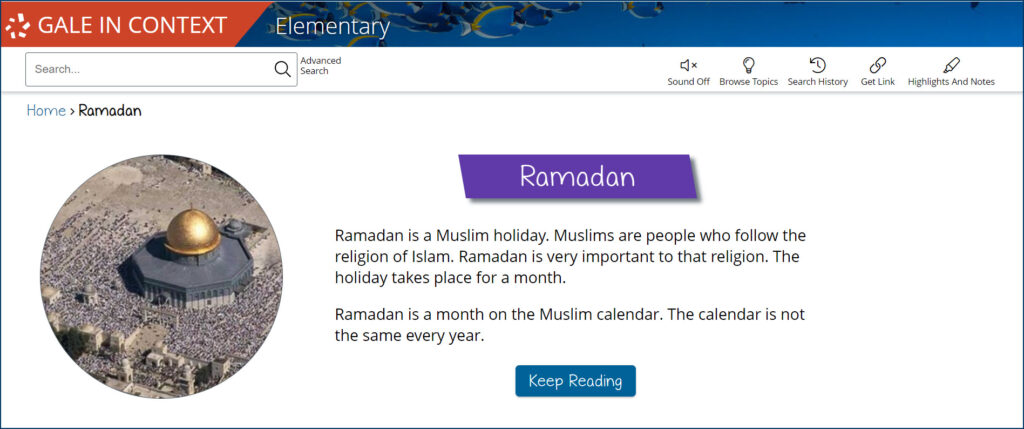| By Gale Staff |
The American classroom is growing increasingly diverse, bringing students from different cultural backgrounds, abilities, genders, and religions into a shared learning space. As an educator, you aspire to create equally diverse lesson plans that integrate multiple perspectives and encourage young learners to be curious about the complex world around them. Nurturing open-mindedness is vital to students’ development into successful, compassionate adults.
This approach is critical regarding certain communities that face negative stereotypes and even violence. Notably, have surged in schools and teachers play a critical role in curbing misperceptions and hate crimes against Muslim students. Such behaviors of Muslim students may generate curiosity among other students. Non-Muslim students may wonder “Why is that girl covering her hair with a scarf?” or “Why is that student not eating pepperoni pizza?” Or “Why is that student not eating lunch?” These are appropriate questions for elementary school children to ponder.
With that in mind, the spring semester presents a special opportunity to celebrate one of the more significant Islamic holidays—Ramadan. Gale In Context: Elementary houses a powerful resource to help you develop your Ramadan-themed lesson plan. Encourage students to explore this unique religious observance through our dedicated Ramadan collection. Foster their curiosity and independent learning with our vetted, age-appropriate content. This engaging topic will fascinate your students and broaden their appreciation of cultural differences.

Learn the Basic Facts Together
Begin your study with the Ramadan summary page. The summary content in Gale In Context: Elementary accommodates the distinct needs of elementary learners, featuring images, helpful vocabulary, and the option to toggle between different reading levels. These tools make information about Ramadan accessible and inviting to younger students, plus they’ll develop autonomy and confidence to explore on their own.
The Muslim calendar follows the lunar cycle, so Ramadan’s exact dates vary from year to year. For 2024, people will observe Ramadan from March 10 through April 9. The Islamic faith teaches that Ramadan marks the month in which God revealed the initial verses of the Qur’an to the prophet Muhammed. During Ramadan, Muslims abstain from eating any food, drinking any liquids, and smoking cigarettes. To mark the end of Ramadan, Muslims share a celebratory three-day festival called Eid al-Fitr.
As students explore Ramadan, they’ll encounter words and ideas that might be new to them, like the Qur’an and . Gale In Context: Elementary has supplemental resources to help them embrace challenging vocabulary and cultivate their learning. They can leverage audio features to hear pronunciations and click embedded links to access further reading on a specific topic. Push them to ask questions and learn the holiday’s fundamental aspects and basic facts about the Muslim community. They’ll develop their critical thinking skills and begin to understand the roots of the religion without fear of misinformation.
Activity Idea: The moon’s phases determine Ramadan’s dates each year, as each new moon marks the start of a new month per the Muslim calendar. Ramadan falls on the 9th cycle of the moon and officially starts when the crescent moon hangs in the sky. Use this fun classroom activity to recreate the moon’s phases in your classroom.
Discuss the Scope of the Muslim Community
With Gale In Context: Elementary, your students can learn about the life of the prophet Muhammed and the subsequent spread of Islam around the world. Islam is the primary religion in dozens of countries, mainly in the Middle East and North Africa—but Pakistan, Indonesia, and India have the largest populations of practicing Muslims. It’s an incredibly diverse yet too often misrepresented religion.
Muslims make up just 1% of the U.S. population, but Islam is actually the second-largest religion in the world. In fact, Islam is the fastest-growing major religious group. However, because of the relatively small percentage of Muslims in our communities. Leverage your Ramadan lesson plan as an opportunity to discuss the scope of the Muslim community worldwide and learn about others’ faith and traditions.
Activity Idea: Use this ready-made quiz from Junior Scholastic and, using their research skills and Gale In Context: Elementary, encourage students to find the answers! Review the correct answers together and have students share anything new they learned or concepts that surprised them.
Discover How Families Celebrate Ramadan
Muslims comprise about one-quarter of the world’s population (almost two billion people), and most of them observe Ramadan. People celebrate the holiday in many ways, but some traditions are consistent. For example, most Muslim adults choose to fast throughout the month of Ramadan, eating only before sunrise and after sundown. These meals are often shared among family members and feature special ingredients.
Help your students understand that Muslim families practice their faith in their own unique ways. For example, some Muslim women may choose to wear the hijab or other head coverings. Some are more relaxed about their fasting. Many people attend their Mosque nightly during Ramadan for a special prayer. As a class, learn how to be respectful and curious about Islam without making generalizations.
Discussion Idea: Ask students to share whether any of their family’s holiday traditions are similar to those of people who observe Ramadan. Finding and celebrating connections between our different backgrounds is an essential strategy for overcoming prejudice.
Integrate Teacher-Specific Tools
We’ve discussed how Gale In Context: Elementary is a valuable database for young students, but what about teachers? Our team is excited to launch Gale In Context: For Educators as part of your school’s Gale subscription. This teacher-dedicated database integrates effortlessly with Gale In Context: Elementary, helping you build lesson plans and customize learning to meet individual student needs.
Gale In Context: For Educators is a shortcut for your busy schedule. Explore lesson plan templates, teacher collaboration tools, and resources to help you achieve your professional goals. Plus, we create all our ready-made classroom activities and instructional tips with state and national curricular standards in mind. When approaching an important but sometimes sensitive subject, like religious and faith practices, trust Gale’s vetted collections and best practice guidance.
Holidays like Ramadan are an engaging, fascinating gateway into different religions and cultures worldwide. If your school is not an active Gale subscriber, contact a local representative to learn more about Gale In Context: Elementary, Gale In Context: For Educators, and all of our dedicated classroom products.

